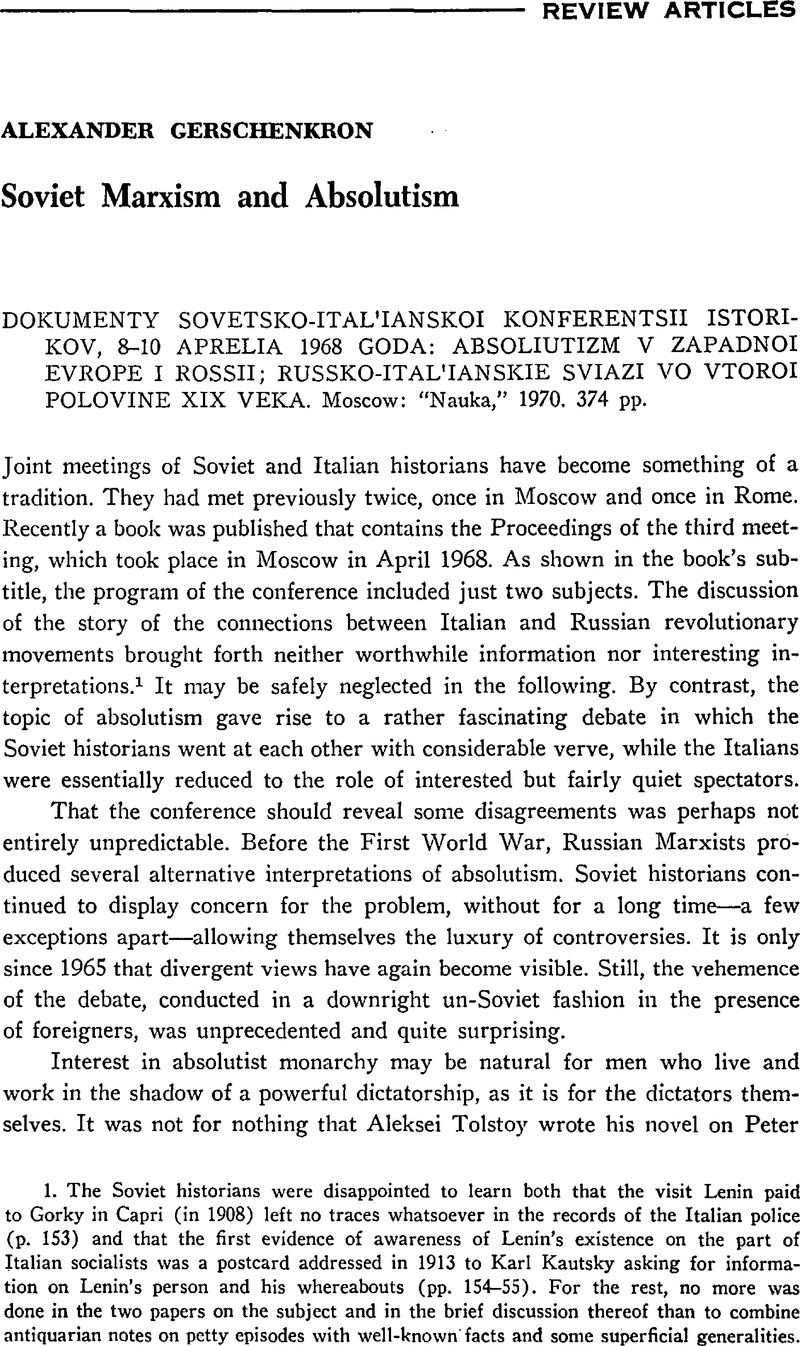Published online by Cambridge University Press: 27 January 2017

1. The Soviet historians were disappointed to learn both that the visit Lenin paid to Gorky in Capri (in 1908) left no traces whatsoever in the records of the Italian police (p. 153) and that the first evidence of awareness of Lenin’s existence on the part of Italian socialists was a postcard addressed in 1913 to Karl Kautsky asking for information on Lenin’s person and his whereabouts (pp. 154-55). For the rest, no more was done in the two papers on the subject and in the brief discussion thereof than to combine antiquarian notes on petty episodes with well-known facts and some superficial generalities.
2. “On the Question of Formation of the Absolute Monarchy in Russia (XVI-XVIII Centuries),” pp. 11-60.
3. Cf. Friedrich Engels, Der Ursprung der Familie, des Privateigentums und des Staates, in Marx, Karl and Engels, Friedrich, Ausgewählte Schrijtcn, 2 vols. (Berlin, 1955), 2: 298 Google Scholar. Engels’s book was first published in 1884. His characterization of the absolutist monarchy goes back to an early remark by Marx in “Die moralisierende Kritik und die kritisierende Moral” ( Marx, Karl and Engels, Friedrich, Werke [Berlin, 1959-68], 4: 346 Google Scholar), where, however, the term “equilibrium” was not yet used. Engels apparently employed the term in this context first in the 1870s in his polemical articles on the Housing Question, where he spoke of the equilibrium between the landed gentry and the bourgeoisie as “the basic condition [Grundbedingung] of the old absolutist monarchy.” See Engels, Friedrich, Zur Woluumgsfrage (Zurich, 1945); p. 119.Google Scholar
4. Lenin, V. I., Sochineniia, 4th ed. (Moscow, 1941-62), 1: 137 Google Scholar
5. Avrekh, A. la., “Russkii absoliutizm i ego rol' v utverzhderiii kapitalizma v Rossii,” Iftoriia SSSR, 1968, no. 2, p. 83 Google Scholar
6. Cf. the references to “interaction” and “in the last analysis” in the preceding statement and the same expressions used by Engels, particularly in the letters to J. Bloch and Hans Starkenburg (W. Borgius?). Marx, and Engels, , Über historischen Materialismus, vol. 1 (Berlin, 1930), pp. 147 and 151.Google Scholar
7. Pavlenko, N. I., ed., Perekhod ot feodalizma k kapitalizmu v Rossii: Materialy dlia obsuzhdeniia (Moscow, 1965).Google Scholar This paper has been republished (Moscow, 1969) under the same title as a volume which includes the record of the discussion that took place in 1965 and in some respects, though not in their sharpness, adumbrates the debates at the present conference.
8. Lenin, , Sochineniia, 4th ed. (Moscow, 1946), 6: 144 Google Scholar, and Polnoe sobranie sochinenii, 5th ed. (Moscow, 1958-66), 21: 32.
9. (image) Methinks this urge to lie Now before this, now before that on one's belly Is based on the spirit of yesterday! A. K. Tolstoy, Pesnia o Potoke-bogatyre These lines were composed in 1871. It appears that their relevance has successfully survived the test of a full century.
10. Statements regarding axioms of this kind flow from Soviet pens with the greatest ease. See, for example, M. la. Volkov’s article in the discussion that followed the conference, “O stanovlenii absoliutizma v Rossii,” Istoriia SSSR, 1970, no. 1, p. 97.
11. Later on, Cherepnin in his concluding remarks will say, “I think we all have one methodology: Marxism-Leninism” (p. 281).
12. Otto Bauer, “Das Finanzkapital,” Der Kampf, 1909/1910, p. 392.
13. See, for example, Pashkov, A. I., ed., Istoriia russkoi ekonomicheskoi mysli, 2 vols, in 3 (Moscow, 1955—60)Google Scholar, vol. 1, part 1. This volume has been translated (or rather mistranslated) into English by Letiche, John M., A History of Russian Economic Thought (Berkeley, 1964).Google Scholar
14. The Soviet historians might well have noted that on the formation of the “all- Russian market,” Lermontov, the indubitable poet, may be a surer guide than Lenin, the dubious historian, as is evidenced by the following three lines from Lermontov’s beautiful Song About Stepan Paramonovich Kalashnikov, where Ivan the Terrible by a ukas establishes a free market “for the whole wide Russian tsardom“: TBOHM 6paTiaM Bearo OT cero me n, ra, Ho Bceiiy iiapcTBy pyccKOMy nrapoKOMy, ToproBaTt 6e3i, aHH0, GecnomaHHHO … To quote Lermontov in this context should be still more reasonable than the thoughtless repetition by reputed scholars of an idol's obiter dictum.
15. Heckscher, Eli F., “Quantitative Measurement in Economic History,” Quarterly Journal of Economics, 53 (1939): 169.CrossRefGoogle Scholar
16. That is why Otto Bauer’s use of “equilibrium of class power” in application to the early years of the Austrian Republic after World War I was at least a perfectly debatable concept, although even in this case the measurable aspects covered only a part of the problem. Cf. his Die österreichische Revolution (Vienna, 1923), pp. 243 ff. See also the first presentation of the concept by Otto Bauer in his parliamentary speeches in 1920 and 1922. Cf. Otto Bauer, Zum Wort gemeldet (Vienna, 1968), pp. 78 and 93-94.Google Scholar
17. The word “hint” deserves a word of explanation. The Russian language has a word ukasanie which has been used in translating two different German words: Hinweis and Weisung. Now, Hinweis implies “hint,” “indication,” “suggestion,” “direction,” while Weisung means “order,” “command,” “directive.” It has been interesting to observe how in Soviet literature the much-used word ukazanie, when applied to the sayings of the fathers of the creed, has lost the connotation of “suggestion” and has acquired that of “command“; and command implied not only an obligation to conduct research in a certain area, to deal with a certain problem, but also to come up with pre-established results.-
18. Cf. Adler, Max, Die Staatsauffassung des Marxismus (Vienna, 1922), p. 33.Google Scholar
19. Cf. similar statements by Porshnev in his recent book, Frantsiia, angliiskaia revoliutsiia i evropeiskaia politika v seredine XVII veka (Moscow, 1970), pp. 19-20.
20. Shapiro, A. L., “Ob absoliutizme v Rossii,” Istoriia SSSR, 1968, no. 5, p. 70.Google Scholar